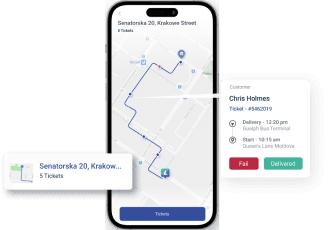TABLE OF CONTENTS

Sign-Up
Enter your email address
In logistics and transportation, efficiency and cost-effectiveness cannot be achieved without the active involvement of fleet management.
The fact that GPS tracking is something that might completely revamp your fleet functionalities as well as save money and be more productive is something that you should know.
Therefore, let us go through some of the potential ways GPS can leverage your fleet into better performance.
What Is GPS Tracking?
A Global Positioning System is used to figure out the exact position of the vehicle by communication with satellites.
These kinds of technology allow the managers of the fleet to keep their eyes on the movements of the vehicles in real time. It offers information about the routes, speeds, and times of stops.
Remember that even just a small piece of information can massively improve the ability to make the right decision in this situation.
Key Benefits of GPS Tracking
Let's look into some particular aspects in which GPS tracking improves the productivity of a fleet.
Real-time Location Tracking
You need to put the vehicles in continuous communication with GPS software which would provide information about their locations in real time. This data is the basis for quick addressing of unforeseen delay or diversion cases.
If the driver has been jammed in traffic, you can send another driver along a different route to help him. This enables the operational personnel to exclusively react to unforeseen turns of events on the road and consequently, it minimizes their downtime.
Improved Route Optimization
GPS revolutionizes the route planning process enormously. It is using traffic records to recommend the best routes. This saves distance, fuel, and money which would otherwise be used in the case study of a less effective method.
Research has found out that the companies that use GPS for routing have reduced their costs of fuel by 10-15%. Have you realized how much more money you would save if you shipped packages intelligently?
Enhanced Customer Service
You should acknowledge the fact that visibility is a factor of improved customer interactions. The extent of customer connection/membership comes when they have access to their deliveries in real-time.
If you navigate through the time of precise arrival, it is often linked to customer delight. In other words, customer loyalty can increase owing to the provision of trustful customer service.
Reduced Fuel Costs
Fuel costs are the largest portion of any operating budget. GPS tracking has two major impacts on fuel consumption; these are alternate routes and the speeding alerts.
Road user behavior is much in the work of the American Transportation Research Institute which is to promote a decrease in fuel consumption and thereby shed hundreds of dollars in a company's annual budget. Ask whether your vehicles cannot live without this technology.
Increased Driver Accountability
The procedure of monitoring vehicle movements is a way of understanding the driving behaviors of drivers. Managers can supervise the parameters like braking too fast, prolonged parking, and excessive acceleration, speeding along with braking hard.
Safer driving leads to lower accident rates, which in turn helps keep insurance premiums low.
Reducing Operational Costs
Now, let us get down to the details of how GPS tracking contributes to a great number of cost-cutting.
Fuel Savings
Speeding, Idling without reason, and even pressing the brake and gas petals abruptly are actions that swallow more fuel.
With the help of GPS monitoring, you can keep the gauge upon driver actions as a result annotating on the best approach to decrease fuel consumption.
Do you know the fact that fuel costs can be one of your main traps enrollment in profits?
Lower Insurance Premiums
Insurance companies usually give rebates to those who use fleet GPS tracking systems. With the information collected about how the driver behaves and the vehicle performance, it makes your insurer conclude that you low risk. Are you missing out on potential savings?
Minimized Overtime Pay
Enhanced route management allows your workforce to finish their tasks earlier. Out of the highway, the less the need for overtime payment. Have you calculated how much overtime impacts your finances?
Reduced Labor Costs
The greatest part of efficient operations is that you need fewer drivers to deliver the clients on time. As you gain more and more profits, you may think about growing your fleet by reinvesting the money saved. Is your current labor spending sustainable?
How to Implement GPS Tracking in Your Fleet
One might think that GPS – integration is a difficult process. On the other hand, coming up with a well-defined course of action, you will be able to introduce this technology smoothly.
Choose the Right Solution
Every GPS tracking solution is not the same. Consider attributes that can be found in live-stone such as real-time tracking, routing capabilities, and reporting tools. Get to know your fleet's particular requirements to opt for a more individualized system.
Train Your Staff
The most efficient development would be educating the employees that know how to operate the new technology properly. Therefore, you must provide them with proper resources and support during the transition. Committed personnel is a must for good success.
Monitor and Adjust
Constant reviewing of the GPS system is important. Monitor the key performance indicators that have implications for your bottom line. Use data insights to guide you in developing action plans. Regular evaluations contribute to consistent improvements in productivity and cost reduction.
The ROI of GPS Tracking
Investing in a GPS tracking tool allows you to make large profits. Based on research conducted by the American Transportation Research Institute, telematics, such as GPS tracking, brings returns that reach 300% to those who have utilized them. This metric proves the point that the savings in money exceed the cost of the system itself.
Conclusion
The GPS tracking system may tremendously help the fleet to be much more productive than before and simultaneously lower the costs of their operations. The real-time data it gives will help in the best routing, efficient time management, and improved driver safety. Along the lines of investing in GPS tracking, you create room for the development of environmentally friendly operations.
Do you need an effective fleet management strategy? You may begin to look into GPS tracking now. We at Lumyri provide extensive solutions customized to your fleet's special needs. Contact us today to find out more!
FAQs
How much does GPS tracking cost?
The cost is variable depending on the provider and the features selected. The entry-level system might cost $20 per car each month, while a more advanced version could be $50 or higher for one car each month.
Will GPS tracking improve driver safety?
Yes. The observation of driver behavior pushes the drivers to engage in safer driving thereby limiting collisions and injuries.
Can GPS tracking help with vehicle maintenance?
Yes. The majority of systems will tell you when necessary servicing is needed, saving you from making large repairs and unexpected breakdowns.
How can GPS tracking enhance customer service?
A live GPS facilitates approximate ETAs for deliveries, enhancing customer satisfaction since their delight is raised through proper information.

Aiden mitchell
As a GPS Tech geek, I find Lumyri's transformative impact on GPS technology on businesses and their customers. Real-time tracking information empowers businesses to provide accurate delivery estimates, allowing customers to plan their schedules with precision.




